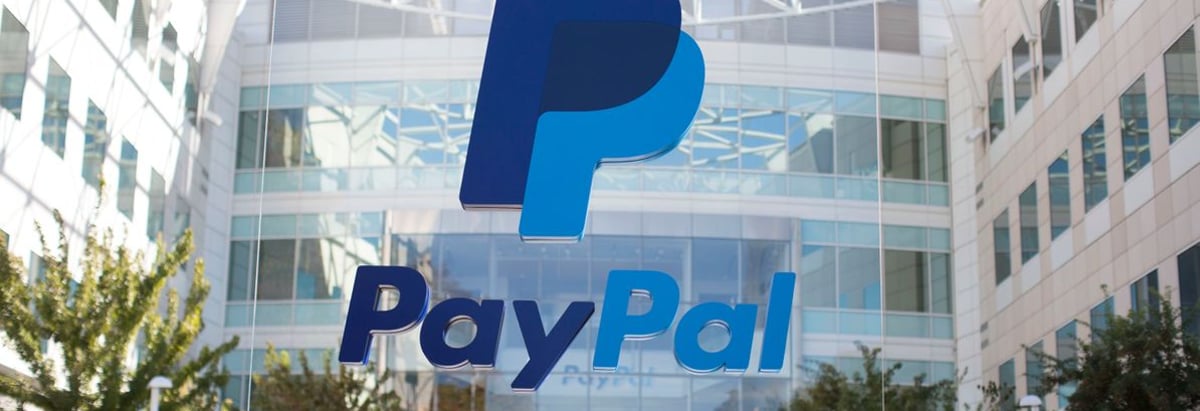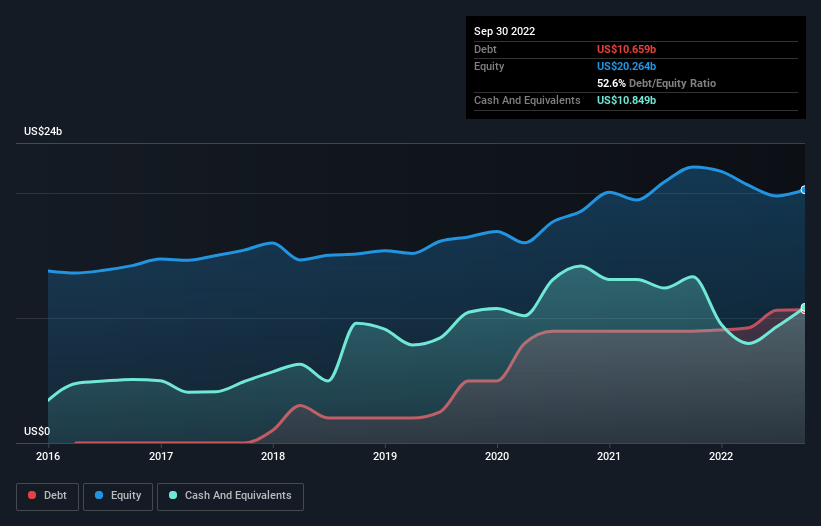- United States
- /
- Diversified Financial
- /
- NasdaqGS:PYPL
PayPal Holdings (NASDAQ:PYPL) Seems To Use Debt Quite Sensibly

David Iben put it well when he said, 'Volatility is not a risk we care about. What we care about is avoiding the permanent loss of capital.' So it seems the smart money knows that debt - which is usually involved in bankruptcies - is a very important factor, when you assess how risky a company is. We note that PayPal Holdings, Inc. (NASDAQ:PYPL) does have debt on its balance sheet. But should shareholders be worried about its use of debt?
Why Does Debt Bring Risk?
Generally speaking, debt only becomes a real problem when a company can't easily pay it off, either by raising capital or with its own cash flow. Ultimately, if the company can't fulfill its legal obligations to repay debt, shareholders could walk away with nothing. While that is not too common, we often do see indebted companies permanently diluting shareholders because lenders force them to raise capital at a distressed price. Of course, debt can be an important tool in businesses, particularly capital heavy businesses. When we think about a company's use of debt, we first look at cash and debt together.
Check out our latest analysis for PayPal Holdings
What Is PayPal Holdings's Net Debt?
You can click the graphic below for the historical numbers, but it shows that as of September 2022 PayPal Holdings had US$10.7b of debt, an increase on US$8.95b, over one year. But it also has US$10.8b in cash to offset that, meaning it has US$190.0m net cash.

A Look At PayPal Holdings' Liabilities
The latest balance sheet data shows that PayPal Holdings had liabilities of US$43.2b due within a year, and liabilities of US$12.9b falling due after that. Offsetting these obligations, it had cash of US$10.8b as well as receivables valued at US$6.95b due within 12 months. So it has liabilities totalling US$38.4b more than its cash and near-term receivables, combined.
While this might seem like a lot, it is not so bad since PayPal Holdings has a huge market capitalization of US$78.7b, and so it could probably strengthen its balance sheet by raising capital if it needed to. But it's clear that we should definitely closely examine whether it can manage its debt without dilution. While it does have liabilities worth noting, PayPal Holdings also has more cash than debt, so we're pretty confident it can manage its debt safely.
But the bad news is that PayPal Holdings has seen its EBIT plunge 11% in the last twelve months. If that rate of decline in earnings continues, the company could find itself in a tight spot. There's no doubt that we learn most about debt from the balance sheet. But it is future earnings, more than anything, that will determine PayPal Holdings's ability to maintain a healthy balance sheet going forward. So if you want to see what the professionals think, you might find this free report on analyst profit forecasts to be interesting.
But our final consideration is also important, because a company cannot pay debt with paper profits; it needs cold hard cash. While PayPal Holdings has net cash on its balance sheet, it's still worth taking a look at its ability to convert earnings before interest and tax (EBIT) to free cash flow, to help us understand how quickly it is building (or eroding) that cash balance. Happily for any shareholders, PayPal Holdings actually produced more free cash flow than EBIT over the last three years. That sort of strong cash conversion gets us as excited as the crowd when the beat drops at a Daft Punk concert.
Summing Up
While PayPal Holdings does have more liabilities than liquid assets, it also has net cash of US$190.0m. The cherry on top was that in converted 134% of that EBIT to free cash flow, bringing in US$5.7b. So we are not troubled with PayPal Holdings's debt use. The balance sheet is clearly the area to focus on when you are analysing debt. However, not all investment risk resides within the balance sheet - far from it. We've identified 2 warning signs with PayPal Holdings , and understanding them should be part of your investment process.
If you're interested in investing in businesses that can grow profits without the burden of debt, then check out this free list of growing businesses that have net cash on the balance sheet.
New: Manage All Your Stock Portfolios in One Place
We've created the ultimate portfolio companion for stock investors, and it's free.
• Connect an unlimited number of Portfolios and see your total in one currency
• Be alerted to new Warning Signs or Risks via email or mobile
• Track the Fair Value of your stocks
Have feedback on this article? Concerned about the content? Get in touch with us directly. Alternatively, email editorial-team (at) simplywallst.com.
This article by Simply Wall St is general in nature. We provide commentary based on historical data and analyst forecasts only using an unbiased methodology and our articles are not intended to be financial advice. It does not constitute a recommendation to buy or sell any stock, and does not take account of your objectives, or your financial situation. We aim to bring you long-term focused analysis driven by fundamental data. Note that our analysis may not factor in the latest price-sensitive company announcements or qualitative material. Simply Wall St has no position in any stocks mentioned.
About NasdaqGS:PYPL
PayPal Holdings
Operates a technology platform that enables digital payments for merchants and consumers worldwide.
Excellent balance sheet and good value.
Similar Companies
Market Insights
Community Narratives



